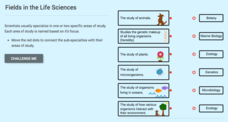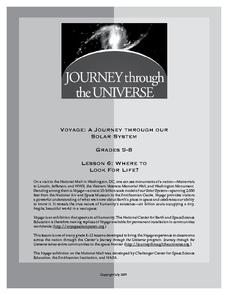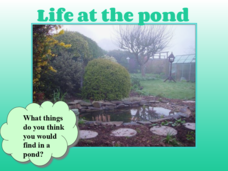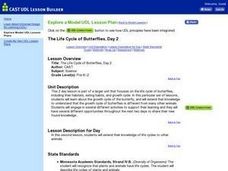CK-12 Foundation
Fields in the Life Sciences
Many fields of study require a specialty and a sub-specialty as you progress through your education. Scholars learn about six sub-specialties of life science. From botany to zoology, our knowledge of the world of living organisms expands...
Scholastic
Study Jams! The Kingdoms of Life
Life science learners discuss the characteristics of five kingdoms of life: animals, plants, fungi, protists, and bacteria in this video. Viewers find out from the dialogue that scientists group organisms according to similarities. This...
Curated OER
Vocabulary 2c - Life Science: From Parents to Young
This life science vocabulary list and definitions will be useful when teaching a parent and offspring unit. Some nice ideas are included in the plan about the word origins, word structure and definition testing methods. There is also a...
Curated OER
Life Science: Living Things
Have your class build their vocabulary bank by studying life science terms. Basic terms like organism, cell, unicellular, and vertebrate are included on the definition sheet provided. Demonstrate how to identify different life science...
NOAA
Introduction to the Ocean Sciences
Engage your class with a mock National Ocean Sciences Bowl. The first installment of a 23-part NOAA Enrichment in Marine sciences and Oceanography (NEMO) program provides an introduction to the ocean sciences, as well as to the rules of...
Curated OER
Science Crossword Puzzles: Life Science
Review some simple life science terms using this short and simple crossword puzzle. Young scientists find 6 terms about photosynthesis and other life science topics using provided clues and then plug them into a crossword.
Teachit
Life Cycle of a Penguin
Celebrate the circle of life with this fun hands-on activity. After cutting out, gluing together, and assembling this visual model, learners are able to spin through and observe the life cycle of penguins.
Ask a Biologist
It’s a Plankton Eat Plankton World
For as small as they are, plankton sure play an enormous role in maintaining marine ecosystems. Dive into an investigation of these tiny organisms with a hands-on life science activity in which children cut out pictures of sea...
Curated OER
How to Use Classroom Animals to Spark Life Science Inquiry
Use low maintenance classroom pets to get your students engaged in life science inquiry investigations.
NOAA
Marine Ecosystems
Be at the top of the food chain when it comes to understanding marine ecosystems. The 21st installment of a 23-part NOAA Enrichment in Marine sciences and Oceanography (NEMO) program investigates marine ecosystems, ocean zones, and food...
Teach Engineering
Life Cycles
Breathe some life into product design. Pupils learn about the stages of product creation, use, and disposal—sometimes called a cradle-to-grave assessment. They see how this cycle relates to the life cycle of organisms.
Curated OER
Ocean Life
Mini-marine biologists use Scholastic Explorers website to learn about declining numbers of leatherback sea turtles and dusky dolphins. They fill out a K-W-L chart and observation journal worksheet, which are both provided in the lesson...
Journey Through the Universe
Where to Look For Life?
Every year we discover new planets including more than 1,000 in 2016 alone. Will we ever find life on another planet? The activity includes two activities to help scholars understand this concept. First, they analyze the temperature...
Curated OER
Frog Life Cycle
Take a look at these amazing photographs and start a class discussion of the life cycle of a frog. Mrs. Frog introduces her babies and asks learners what they are called. They will view the process by which her babies change into...
Curated OER
Fifth Grade Life Science Review/Quiz
In this life sciences review or quiz worksheet, 5th graders use recall of knowledge to answer multiple choice questions. Students answer 20 questions.
NOAA
Watch the Screen!
Can a sponge cure cancer? Life science pupils visit the drugstore under the sea in the fifth instructional activity of six. Working groups research the topic then get hands-on experience by testing the inhibiting effects of several...
Mascil Project
Molecular Gastronomy - Science in the Kitchen
Some say cooking is an art—and a science! Scholars scope out the savory subject of molecular gastronomy with a series of related activities. The teacher's guide contains printable worksheets and helpful tips for implementing the...
NOAA
Invertebrates
Crabs and lobsters ... yum! The 18th installment of a 23-part NOAA Enrichment in Marine sciences and Oceanography (NEMO) program focuses on invertebrate marine life. After the lecture slideshow, learners conduct an activity to sample...
NOAA
Marine Policy
Save the oceans! The 22nd installment of a 23-part NOAA Enrichment in Marine sciences and Oceanography (NEMO) program focuses on laws and marine policy. Pupils take part in an activity investigating fisheries stock data.
Curated OER
3rd grade life science
In this life science worksheet, 3rd graders answer multiple choice questions about plants, birds, habitats, and more. Students complete 20 questions.
Curated OER
The Life Cycle of Butterflies, Day 2
Second graders extend their knowledge of life cycles to other animals. They demonstrate their understanding that at the beginning of an animal's life cycle, some young animals represent the adult while others do not. They will...
Curated OER
Jeopardy: Science
Need a science activity for a rainy day? This Jeopardy game is a perfect way to keep students entertained while they are stuck inside for recess. The five categories are: Things that Grow, Animals, Geology, Weather, and It's Electric....
Curated OER
Life Science: Plant Life Cycles
Practice defining words that have to do with plant life cycles. The list included here is mainly for structural units, but could be used to review their relevance and the process of the life cycle.
Curated OER
Vocabulary 1a: Life Science: Living Things
Life science vocabulary comes alive through repeated exposure. With the instructor, words are defined and posted in the classroom. Learners repeat the definitions in their own words and review them often. Extension ideas and links are...

























